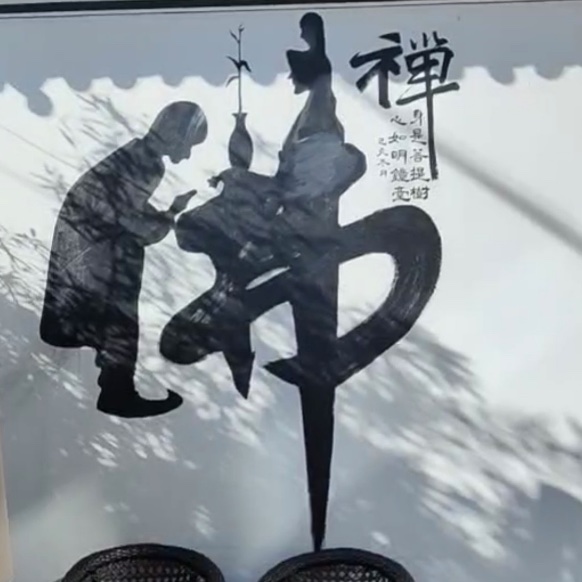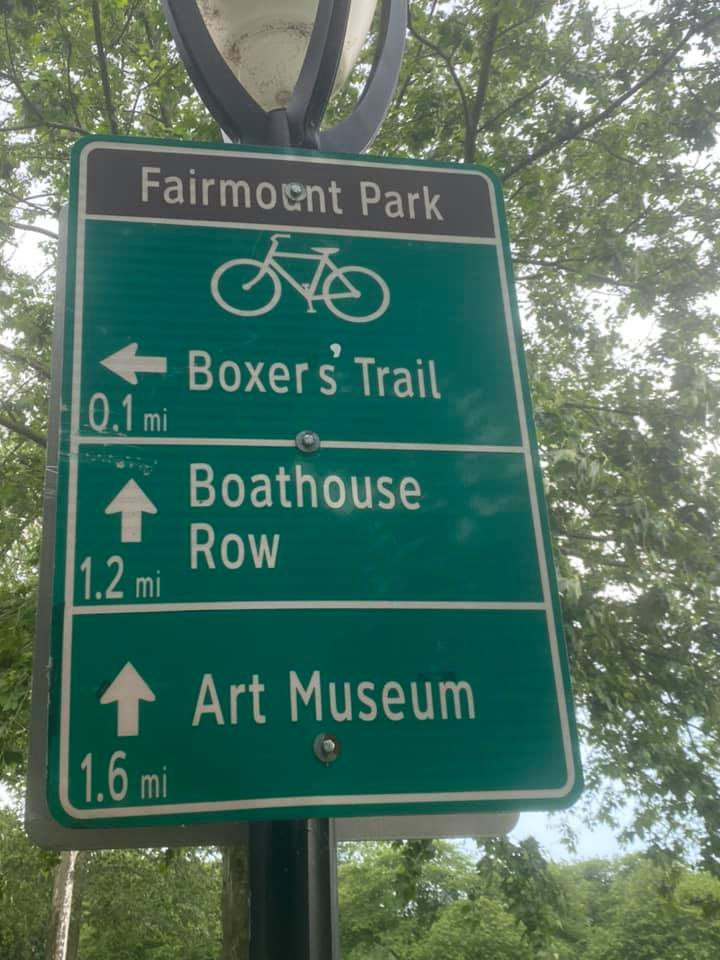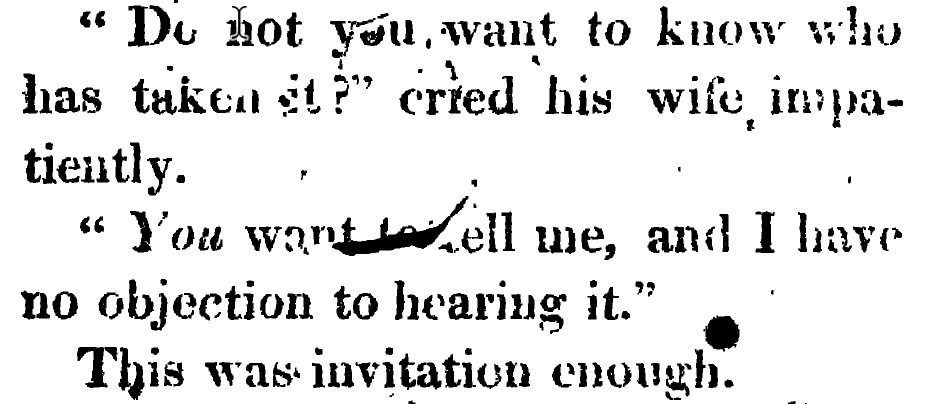Archive for Orthography
February 18, 2022 @ 7:06 am· Filed by Mark Liberman under Orthography
It's well known that Jane Austen's novels made extensive use of italics to mark prosodic focus. Here's the first example from Pride and Prejudice, which occurs in the eighth sentence of the work, on p. 2 of the 1813 first edition:
"Do not you want to know who has taken it?" cried his wife impatiently.
"You want to tell me, and I have no objection to hearing it."
This was invitation enough.
Read the rest of this entry »
Permalink
December 20, 2021 @ 7:36 am· Filed by Mark Liberman under Orthography, Parsing, Psychology of language
This NYT link text needed a second reading for me to break the initial prepositional phrase after "Bruce Springsteen", and start the main-clause subject conjunction with "Bob Dylan":
Like Bruce Springsteen, Bob Dylan, Paul Simon, Tina Turner and others have all sold rights to their music for eye-popping prices.
Read the rest of this entry »
Permalink
November 18, 2021 @ 9:43 pm· Filed by Victor Mair under Morphology, Orthography, Phonetics and phonology, Writing, Writing systems
Commenting on "Educated (and not so educated) guesses about how to read Sinographs" (11/16/21), Chris Button asked:
I’m curious what you mean by “pseudo explanation”? The expected reflex from Middle Chinese times is xù, but yǔ has become the accepted pronunciation based on people guessing at the pronunciation in more recent times. Isn’t that a reasonable explanation?
To which I replied:
It's such a gigantic can of worms that I'm prompted to write a separate post on this mentality. I'll probably do so within a few days, and it will be called something like "Morphemes without characters".
Stay tuned.
Read the rest of this entry »
Permalink
November 11, 2021 @ 9:59 am· Filed by Victor Mair under Language and art, Language and religion, Orthography, Writing
On the wall of an apartment complex in Dali, Yunnan, southwestern China:

Read the rest of this entry »
Permalink
November 10, 2021 @ 5:29 pm· Filed by Victor Mair under Language and sports, Neologisms, Orthography, Word of the year, Words words words
Mezurashii / めずらしい / 珍しい ("amazing; wonderful; rare"). Love 'em! Such creativity! Such imagination!
"Japan’s Words of 2021: Nominees Announced for Annual List"
Language Nov 4, 2021
On November 4, the publisher Jiyū Kokumin Sha announced its list of nominees for the words and phrases best representing the year 2021. Our complete list of the nominees with explanations.
New Words for a Pandemic Year
Each year Jiyū Kokumin Sha, the publisher of Gendai yōgo no kiso chishiki (Basic Knowledge on Contemporary Terminology), an annual guide to the latest terms in use in the Japanese language, holds its contest to decide the Words of the Year. For 2021, the nominating committee selected a list of 30 terms that have made themselves a part of the spoken and written landscape in Japan this year.
….
Read the rest of this entry »
Permalink
October 13, 2021 @ 9:41 am· Filed by Victor Mair under Etymology, Language and philosophy, Language and sports, Morphology, Orthography, Phonetics and phonology
From Zihan Guo:
A Japanese expression I came upon in a reading from Takami sensei's class reminded me of the "om" you mentioned weeks ago in our class.
阿吽の呼吸(aun'nokokyū あうんのこきゅう)
It refers to the
synchronization of breathing of sumo opponents before a match. I read about this in an article about an interview with a sumo wrestler. But the "aun あうん" part lingered in my mind. Then I realized that it was the Japanese transliteration of the "om" that you were telling the class that encompassed all sounds: "a" and "un" signify the beginning and end of the cosmos respectively, or so
wikipedia explains. The Japanese phrase means a harmonious, non-verbal communication.
Read the rest of this entry »
Permalink
August 19, 2021 @ 10:57 am· Filed by Mark Liberman under Humor, Orthography
Read the rest of this entry »
Permalink
August 9, 2021 @ 11:38 am· Filed by Victor Mair under Language and education, Language and politics, Language teaching and learning, Orthography, Pedagogy, Writing systems
Article by Colm Keena in The Irish Times (8/2/21):
"Decision on Mandarin Leaving Cert exam ‘outrages’ Chinese communities:
Exam subject that students can sit from 2022 will only allow for simplified Chinese script"
Here are the first four paragraphs of the article:
Chinese communities in Ireland are “outraged” by the decision of the Department of Education to use only a simplified script in the new Leaving Certificate exam in Mandarin Chinese, according to a group set up to campaign on the issue.
The new exam subject, which students can sit from 2022, will not allow for the use of the traditional or heritage Chinese script, which is used by most people from Hong Kong, Taiwan, and other, mostly non-mainland-China locations.
The decision by the department is a “discrimination against the heritage Chinese learners in Ireland,” according to Isabella Jackson, an assistant professor of Chinese history in Trinity College, Dublin, who is a member of the Leaving Cert Mandarin Chinese Group.
“It is wrong for our Irish Government to deny children of a Hong Kong, Taiwan, and Macau background the right to sit an examination using the Chinese script that is part of their heritage.”
Read the rest of this entry »
Permalink
July 30, 2021 @ 7:07 am· Filed by Victor Mair under Colloquial, Errors, Miswriting, Orthography, Philology, Phonetics and phonology, Reading, Vernacular
I wrote to a colleague who helped me edit a paper that it had been accepted for publication. She wrote back, "I’m glad it is excepted".
Some may look upon such a typo as "garden variety", but I believe that it tells us something profoundly significant about the primacy of sound over shape, an issue that we have often debated on Language Log, including how to regard typographical errors in general, but also how to read old Chinese texts (e.g., copyists' mistakes, deterioration of texts over centuries of editorial transmission, etc.).
Often, when you read a Chinese text and parts of it just don't make any sense, if you ignore the superficial semantic signification of the characters with which it is written, but focus more on the sound, suddenly the meaning of the text will become crystal clear. In point of fact, much of the commentarial tradition throughout Chinese history consists of this kind of detective work — sorting out which morphemes were really intended by a given string of characters.
Read the rest of this entry »
Permalink
July 1, 2021 @ 6:04 am· Filed by Victor Mair under Etymology, Orthography, Topolects, Words words words
[This is a guest post by Tom Mazanec]
I recently became curious about the origins of the Cantonese word king1 gai2 傾偈 ("to chat"). Though I've never formally studied Cantonese, I'm picking up bits of it from my wife and in-laws, who moved to the U.S. from Guangzhou about 30 years ago and use Cantonese to speak to each other and to my children. I like to think I know it slightly better than my 1-year-old and almost as well as my 3-year-old. My in-laws use the term king1 gai2 often, especially in light-hearted tone to describe the kids' pre-verbal babbling when they were under 1.
The equivalent phrase in Mandarin is
liáo tiān(r) 聊天(兒), which appears to have no relation to
king1 gai2. So this got me wondering about where
king1 gai2 came from. On its surface, the characters appear to mean "pouring out
gāthās" (
gāthā: "song" in Sanskrit; "Buddhist verse" in Chinese). This makes little sense (though it would've been nice to put it into my
T'oung Pao article on
gāthās a few years ago), so I suspected the characters 傾偈 were used in a purely phonetic manner. Sure enough, the word is also sometimes written as 傾計 (
king1 gai2).
Read the rest of this entry »
Permalink
June 12, 2021 @ 9:14 am· Filed by Mark Liberman under Language and culture, Orthography
 From a Reliable Source:
From a Reliable Source:
I thought you might enjoy this as yet officially unreported dispute about a sign being posted in Phil. The sign originally said, "Boxer's Trail," because Joe Frazier famously ran along it to train, and later Ali ran on it once to psyche out Joe (Ali worked out in Overbrook, apparently). Someone or other complained that more than one boxer had used the trail, and so they had to move the apostrophe. Meanwhile, people are arguing about whether the trail should be dedicated to Frazier, or to all boxers. And then someone of course had to throw in a question about whether any of the boxers had boxers (dogs) and if then it should say boxers' boxers trail or boxer's boxers trail, and so on.
Read the rest of this entry »
Permalink
May 5, 2021 @ 3:15 pm· Filed by Victor Mair under Grammar, Lost in translation, Orthography, Parsing
@JDMayger May 4:
Read the rest of this entry »
Permalink

